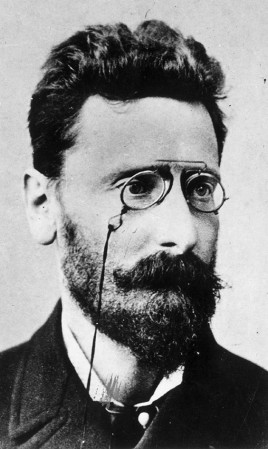Pulitzer Prizes: Honoring Distinguished Achievement for 100 Years
Tuesday, April 19th, 2016April 19, 2016
The announcement of the 2016 winners of the Pulitzer Prizes marked the 100th anniversary of awards that have become the most coveted annual honors presented to American journalists, fiction writers, poets, playwrights, historians, and composers. Special committees selected winners in 21 categories—14 in journalism and 7 in the arts and literature, along with at least 2 additional finalists in each category.

Joseph Pulitzer, a Hungarian immigrant, became one of the greatest American newspaper publishers in history. He established the Pulitzer Prizes for achievements in journalism, literature, music, and art. © Hulton Archives/Getty Images
The most visible prizewinner this year is Hamilton, a musical that won the award in the drama category. Hamilton is the critically acclaimed box office blockbuster about the founding of the United States told through a mixture of musical styles, including rap and pop. American biographer T. J. Styles almost won a rare double for Custer’s Trials, a. biography of Gen. George Armstrong Custer. The book received the history prize and was one of the two finalists in the biography or autobiography category. Styles had won a biography prize in 2010.
As usual, the largest American newspapers were prominent in gathering journalism awards, including the staff of the Los Angeles Times (breaking news reporting); the staff of The Washington Post (national reporting); Alissa J. Rubin of The New York Times for international reporting and four New York Times photographers for breaking news photography); and The Boston Globe’s writer Farah Stockman for commentary and photographer Jessica Rinaldi for feature photography. The New Yorker magazine writer Kathryn Schulz won a prize for feature writing, and the publication’s television critic Emily Nussbaum won the prize for criticism.
In the arts, the closely watched fiction prize was given to University of Southern California professor Viet Thanh Nguyen for his novel The Sympathizer. The author, who was born in Vietnam, had earned widespread praise for his story rooted in the Vietnam War (1957-1975). In the music category, Henry Threadgill, a jazz composer and musician, won for his composition In for a Penny, In for a Pound. Threadgill became the third jazz composer to win the award.
The Pulitzer Prizes were established by Joseph Pulitzer, a newspaper publisher who founded the St. Louis Post-Dispatch. The first prizes were awarded in 1917. They are awarded in April by Columbia University on the recommendation of the Pulitzer Prize Board. Anyone may recommend a work for a Pulitzer Prize by writing to the Pulitzer Prize office in New York City. Jurors are appointed for one year at a time. Most journalism juries consist of journalists. Most literature juries consist of distinguished writers, critics, or academic authorities for each category. Most music juries consist of composers and music critics. Each jury makes three nominations to the board. The board may accept or reject the findings of any jury or make substitute recommendations. The board votes to determine the winner of each category. If the board feels no nominated work is worth a prize, the prize may be withheld. Winners receive $10,000, except for the prize for public service in journalism. The winner of that prize receives a gold medal.
Other World Book articles
- See Pulitzer Prizes (1998-2014) – Back in Time articles


